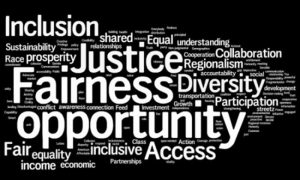Shinta Hernandez
Question #3: Please tell me about an Open Education project, textbook, or group that you have been a part of.
I’ve been fortunate to have been a part of many Open Education projects in the last several years, particularly since the start of the Achieving the Dream OER Z degree grant that Montgomery College received. But the one that I’d like to touch on here is the United Nations Sustainable Development Goals Open Pedagogy Faculty Fellowship. I know that’s a mouthful.
At Montgomery College, we were doing really well helping our students save money on Z courses by offering high quality free educational materials. Z stands for Zero Degree or Zero Cost Materials. To this day, we have saved our students $7.3 million through the wide variety of Z courses that we offer. Now of course that’s great news for our students and great news for us but we wanted to take this whole Open Education and Open Pedagogy journey just one step further. We wanted Open Pedagogy to impact our students and our communities through a social justice lens. After attending the Open Ed Conference in 2017 in Anaheim, California, a Montgomery College colleague and I were discussing how there really wasn’t anything in the world where Open Pedagogy and community engagement were intertwined. Eventually, we came up with the United Nations Sustainable Development Goals Open Pedagogy Faculty Fellowship. The conceptual framework on which this fellowship is based is the seventeen goals that the United Nations wants the world to address by the year 2030. These goals are really designed to achieve and maintain global justice.

What happens is that faculty fellows who are selected to be part of this competitive fellowship are teamed up in interdisciplinary and inter-institutional teams and then they create renewable OER assignments to help their students achieve those United Nations Sustainable Development goals of their choice. Basically, the fellowship uses Open Pedagogy to put students at the center of their learning process and makes them agents of change in their communities. The students go out using their Open Pedagogy projects to help save the world, if you will. Through this fellowship, we’ve basically married the concepts of Open Pedagogy and community engagement. We’re now in year four of this fellowship and we’re so proud to say that, in just a short period of time, we have seven institutional partners across the United States and Canada. We’re really excited to once again do this work in the summer of 2021 with a brand new cohort of faculty fellows and with some brand new institutional partners. The fellows will be from across the seven institutional partners. Just the other day, the leadership team across those seven institutions met to talk about our fellows that we’ve selected. What will happen is a sort of a matchmaking process where we will take all the fellows from all seven institutions who’ve been selected and match them based on discipline and keeping in mind that one of the teams will have to be interdisciplinary. The teams have to be across the institutions so we will try our best not to have two people from the same institution. We will have one person from place X and another person from place Y.
